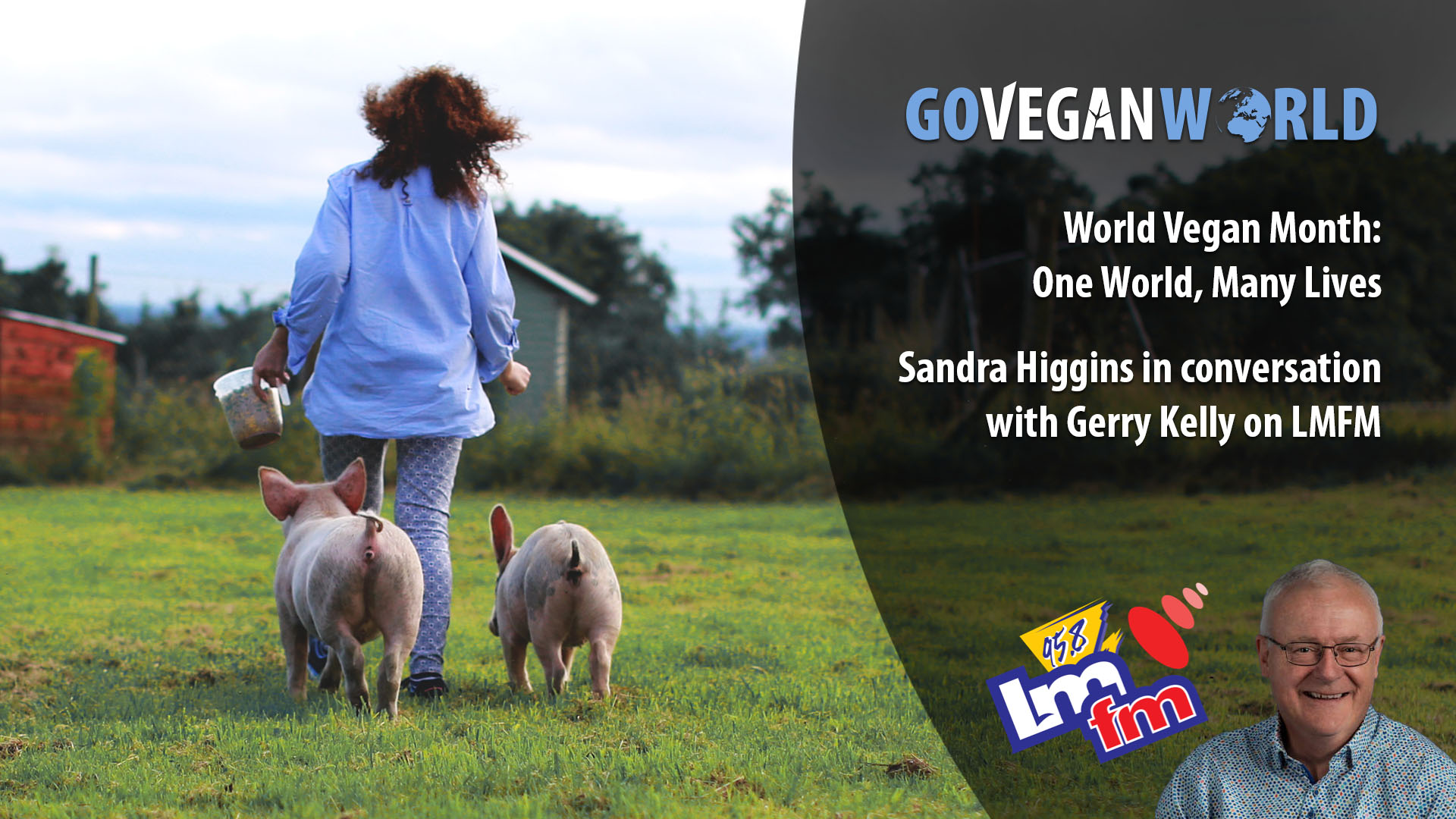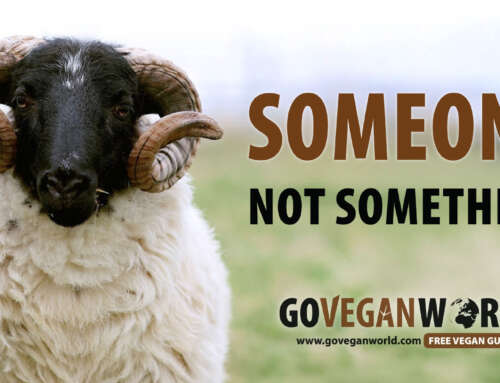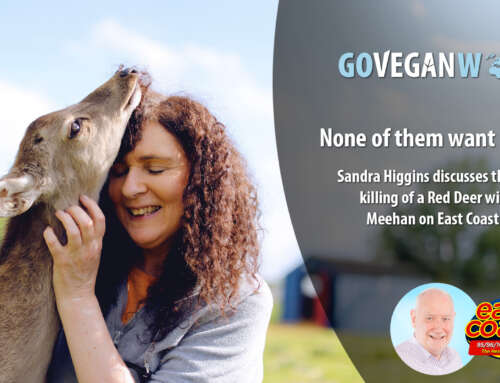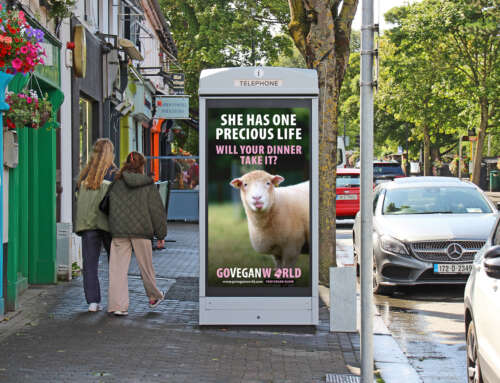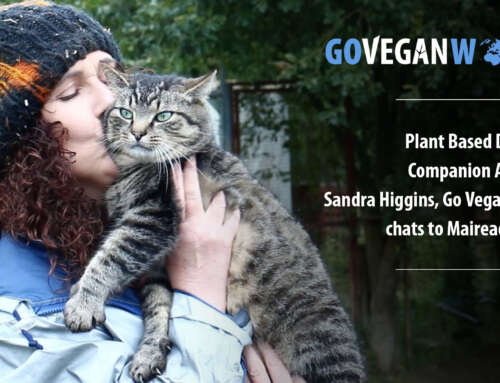World Vegan Month 2024: One World, Many Lives
Sandra Higgins of Go Vegan World recently discussed World Vegan Month with Gerry Kelly on LMFM.
14 Nov 2024
Many people think that the problem faced by other animals at the hands of humans, is abuse or cruelty. While what we inflict on them is undoubtedly cruel and abusive, how we treat them is not the crux of the issue. Seeking better ways to treat them amounts to animal welfare which perpetuates the status quo of animal use: humans using other animals as resources when we have no right (or need) to use them at all. The problem we need to address is speciesism: the human supremacist view that we are superior to other animals and that because they are members of a non-human species, their role in life is to be bred as commodities to serve us.
Our role at Go Vegan World is to confront speciesism and educate the non-vegan public about facts that have been hidden from them by the corrupt industries that profit from maintaining the demand for human use of other animals. Our current World Vegan Month campaign on billboards in Ireland Glasgow, Edinburgh and London, and on buses in the Republic of Ireland and in Northern Ireland, highlights animal rights, animal sentience, and the harmful effects of animal agriculture on global warming and the environment.
Every time we speak to non-vegans, they tell us that they were not previously aware of the facts we convey in our campaigns. Most people are not aware that day old male chicks are killed in the egg industry[i], or that hens suffer high rates of prolapse, infection, fractures[ii] and reproductive cancer[iii]. They are not aware that in their natural state hens would only lay a few eggs a year. They are not aware that calves are separated from their mothers in the dairy industry[iv]. They think that animal products are normal, natural, necessary and nice and they do so because of the propaganda[v] forced on them from an early age[vi],[vii] by a corrupt industry[viii] [ix] [x] [xi]that spends vast sums every year ensuring the continued demand for their products through public ignorance.
In Ireland, a significant number of people are worried about climate change (85%); yet only 67% are aware that agriculture is by far the highest emitter of greenhouse gases in Ireland[xii] (currently 37.8% of total emissions[xiii]), mostly caused by animal agriculture. Global food emissions are not that much different ranging from 26% to 34%[xiv], again most of those emissions coming from animal agriculture. While most people accept that we need to stop using fossil fuels, they are not aware that even if this goal is achieved, emissions from our current food system that includes animal products, will raise global temperatures to catastrophic levels[xv] [xvi]. We cannot address the issue of climate change without changing how we produce and consume food. Transitioning to non-animal agriculture and a plant-based diet is an essential component of the climate change solution.
Emissions are not the only problem associated with our diet. Animal agriculture also causes water pollution, loss of biodiversity, and is not only immoral, it is incredibly inefficient using 77% of the world’s farmland and a vast amount of the world’s freshwater, and only produces 18% of our calorie requirements.
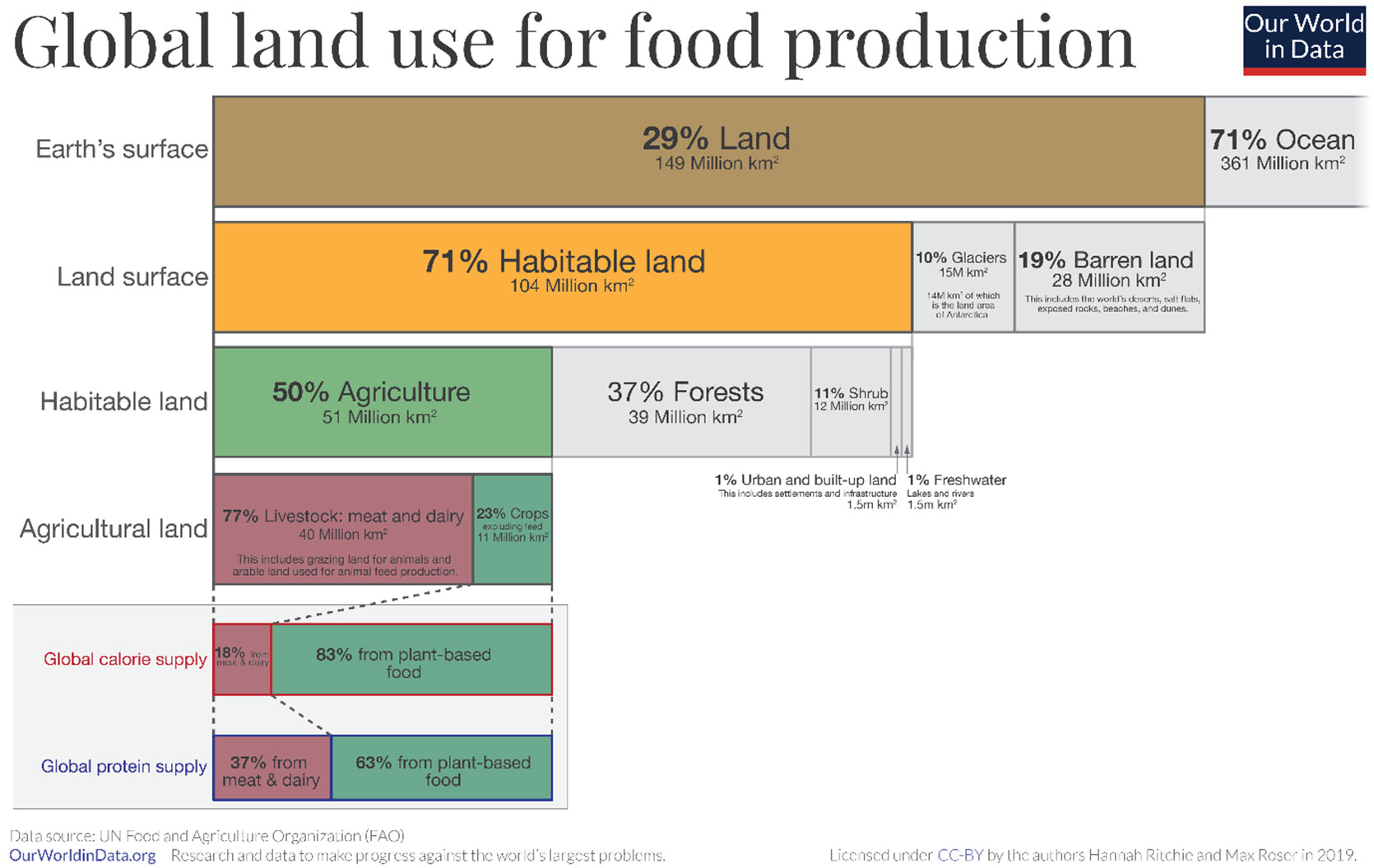
During our interview, Gerry asked Sandra about the nutritional quality of a plant-based, vegan diet. We invite listeners to use the links on our website to access information on nutrition from recognised dietetic associations and peer reviewed literature to reassure themselves that a 100% plant diet can fulfil all our nutritional needs. It is important that people who go vegan consume fortified food and supplement their intake of vitamin B12.
Our current methods of food production are unsustainable and those who lobby for them do not have the interests of the public at heart. Indeed, if they were truly interested in the farmers they claim to represent, they would advocate for a transition to non-animal agriculture and plant-based food production because the current, unsustainable system, does not have a future. Claiming that animal agriculture is of (short-term) benefit to Ireland on economic grounds is a classic example of injustice and speciesism. These attempts at justification of animal use echo those used by tobacco farmers. Indeed, they are the arguments used by sex traffickers and drug cartels profiting from the people they enslave and exploit. Ireland’s demands to be continue business as usual in the face of evidence[xvii] demanding the elimination or at the very least a radical reduction in the activities responsible for harming farmed animals, free living animals, the environment and humans alike, epitomises exceptionalism, speciesism, and injustice. Everyone deserves to have an income that allows a decent standard of living and gives meaning and enjoyment to life but not at the expense of violating the rights of others. There is nothing whatsoever to recommend animal agriculture. Indeed, many farmers are earning well below the minimum wage[xviii] and working in an industry with the highest rate of workplace accidents including fatal injuries. Claims that farmers would face economic loss in a vegan world do not hold up. Farmers cater for the food and other needs of humans. Those needs do not change when people eliminate the exploitation of other animals from their lives. There are many ethical alternatives to animal agriculture including producing plant food for human consumption, using agricultural land for renewable energy, and rewilding land to restore biodiversity. Transitioning to a 100% plant (vegan) diet, has the potential to ameliorate global warming, environmental destruction and eliminate the exploitation of other animals as human resources[xix].
We only have one planet, and we are rapidly destroying its ability to sustain life. Humans are only one of the many species living on planet Earth. We do not have the right to use other lives as commodities or resources to meet our tastes, convenience, habits and traditions. Everyone has the right to live free of oppression. Differences in race, religion, gender, age, and species do not justify exploitation. When we abolish animal use from our lives by going vegan, we are not being kind or compassionate; we are being fair by respecting their rights not to be owed, exploited or killed.
[i] S.I. No. 14/2008 – European Communities (Welfare of Farmed Animals) Regulations 2008 Part 5 Slaughter of Animals (Point 23) Disease control, fur animals, surplus chicks) https://www.irishstatutebook.ie/eli/2008/si/14/made/en/print
[ii] Higgins, S (2015) Enriched Cages, Embodied Prisons. http://edenfarmedanimalsanctuary.com/wp-content/uploads/2013/05/Enriched-Cages-and-Embodied-Prisons.pdf
[iii] Hawkridge AM. The chicken model of spontaneous ovarian cancer. Proteomics Clin Appl. 2014 Oct;8(9-10):689-99. doi: 10.1002/prca.201300135. PMID: 25130871; PMCID: PMC4924577. https://pmc.ncbi.nlm.nih.gov/articles/PMC4924577/
[iv] Beaver A, Meagher RK, von Keyserlingk MAG, Weary DM. Invited review: A systematic review of the effects of early separation on dairy cow and calf health. J Dairy Sci. 2019 Jul;102(7):5784-5810. doi: 10.3168/jds.2018-15603. Epub 2019 May 10. PMID: 31079908; PMCID: PMC7094284. https://pmc.ncbi.nlm.nih.gov/articles/PMC7094284/
[v] EU School Milk Scheme https://ndc.ie/school-resources/
[vi] Gibbons, J (2020) How Big Ag is Influencing What Irish Students Learn about Climate Change, Desmog https://www.desmog.com/2020/12/15/big-ag-influencing-irish-students-climate-change/
[vii] MooCrew EU School Milk Scheme https://ndc.ie/school-resources/
[viii] Cooke, P and Herrmann, M (2024) Mapped: Inside Ireland’s Powerful Farming Lobby, from the series Investigating Ireland’s Influential Ag Lobby, Desmog https://www.desmog.com/2024/09/25/mapped-ireland-powerful-farming-lobby/
[ix] The Dublin Declaration is Riddled with Animal Industry Bias, Sentient Media https://sentientmedia.org/dublin-declaration-animal-industry/ Acccessed 15.11.2024
[x] Krattenmacher, Jochen and Espinosa, Romain and Sanders, Edel and Twine, Richard and Ripple, William J., The Dublin Declaration: Gain for the Meat Industry, Loss for Science (September 16, 2024). Forthcoming in Environmental Science & Policy, Available at SSRN: https://ssrn.com/abstract=
[xi] Bryant, C., Aiking, H., Alessandrini, R. et al. The Dublin Declaration fails to recognize the need to reduce industrial animal agriculture. Nat Food 5, 799–801 (2024). https://doi.org/10.1038/s43016-024-01054-2
[xii] EPA Ireland Climate Opinion Maps, https://www.epa.ie/our-services/monitoring–assessment/climate-change/climate-opinion-maps/
[xiii] https://www.epa.ie/our-services/monitoring–assessment/climate-change/ghg/latest-emissions-data/
[xiv] Crippa, M., Solazzo, E., Guizzardi, D. et al. Food systems are responsible for a third of global anthropogenic GHG emissions. Nature Food (2021).
[xv] Hannah Ritchie (2021) – “Emissions from food alone could use up all of our budget for 1.5°C or 2°C – but we have a range of opportunities to avoid this” Published online at OurWorldinData.org. Retrieved from: ‘https://ourworldindata.org/food-emissions-carbon-budget’ [Online Resource]
[xvi] Clark, Michael A., Nina GG Domingo, Kimberly Colgan, Sumil K. Thakrar, David Tilman, John Lynch, Inês L. Azevedo, and Jason D. Hill. “Global food system emissions could preclude achieving the 1.5° and 2° C climate change targets.” Science 370, no. 6517 (2020): 705-708.
[xvii] Helen Harwatt, Matthew Hayek, Paul Behrens, William Ripple (2024) Options for a Paris-Compliant Livestock Sector, Timeframes, targets and trajectories for livestock sector emissions from a survey of climate scientists https://animal.law.harvard.edu/wp-content/uploads/Paris-compliant-livestock-report.pdf
[xviii] Teagasc National Farm Survey 2023 https://www.teagasc.ie/news–events/news/2024/teagasc-confirms-extent-o.php Accessed 15.11.2024
[xix] Scarborough, P., Clark, M., Cobiac, L. et al. Vegans, vegetarians, fish-eaters and meat-eaters in the UK show discrepant environmental impacts. Nat Food 4, 565–574 (2023). https://doi.org/10.1038/s43016-023-00795-w

